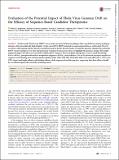| dc.contributor.author | Kugelman, Jeffrey R. | |
| dc.contributor.author | Sanchez-Lockhart, Mariano | |
| dc.contributor.author | Andersen, Kristian G. | |
| dc.contributor.author | Gire, Stephen | |
| dc.contributor.author | Park, Daniel J. | |
| dc.contributor.author | Lin, Aaron E. | |
| dc.contributor.author | Wohl, Shirlee | |
| dc.contributor.author | Sabeti, Pardis C. | |
| dc.contributor.author | Kuhn, Jens H. | |
| dc.contributor.author | Palacios, Gustavo F. | |
| dc.contributor.author | Sealfon, Rachel Sima | |
| dc.date.accessioned | 2015-02-11T16:09:18Z | |
| dc.date.available | 2015-02-11T16:09:18Z | |
| dc.date.issued | 2015-01 | |
| dc.date.submitted | 2014-10 | |
| dc.identifier.issn | 2150-7511 | |
| dc.identifier.uri | http://hdl.handle.net/1721.1/94325 | |
| dc.description.abstract | Until recently, Ebola virus (EBOV) was a rarely encountered human pathogen that caused disease among small populations with extraordinarily high lethality. At the end of 2013, EBOV initiated an unprecedented disease outbreak in West Africa that is still ongoing and has already caused thousands of deaths. Recent studies revealed the genomic changes this particular EBOV variant undergoes over time during human-to-human transmission. Here we highlight the genomic changes that might negatively impact the efficacy of currently available EBOV sequence-based candidate therapeutics, such as small interfering RNAs (siRNAs), phosphorodiamidate morpholino oligomers (PMOs), and antibodies. Ten of the observed mutations modify the sequence of the binding sites of monoclonal antibody (MAb) 13F6, MAb 1H3, MAb 6D8, MAb 13C6, and siRNA EK-1, VP24, and VP35 targets and might influence the binding efficacy of the sequence-based therapeutics, suggesting that their efficacy should be reevaluated against the currently circulating strain. | en_US |
| dc.description.sponsorship | United States. Defense Threat Reduction Agency | en_US |
| dc.description.sponsorship | National Science Foundation (U.S.). Graduate Research Fellowship Program (Grant DGE 1144152) | en_US |
| dc.language.iso | en_US | |
| dc.publisher | American Society for Microbiology | en_US |
| dc.relation.isversionof | http://dx.doi.org/10.1128/mBio.02227-14 | en_US |
| dc.rights | Creative Commons Attribution | en_US |
| dc.rights.uri | http://creativecommons.org/licenses/by-nc-sa/3.0/ | en_US |
| dc.source | American Society for Microbiology | en_US |
| dc.title | Evaluation of the Potential Impact of Ebola Virus Genomic Drift on the Efficacy of Sequence-Based Candidate Therapeutics | en_US |
| dc.type | Article | en_US |
| dc.identifier.citation | Kugelman, Jeffrey R., Mariano Sanchez-Lockhart, Kristian G. Andersen, Stephen Gire, Daniel J. Park, Rachel Sealfon, Aaron E. Lin, et al. “Evaluation of the Potential Impact of Ebola Virus Genomic Drift on the Efficacy of Sequence-Based Candidate Therapeutics.” mBio 6, no. 1 (January 20, 2015): e02227–14. | en_US |
| dc.contributor.department | Massachusetts Institute of Technology. Computer Science and Artificial Intelligence Laboratory | en_US |
| dc.contributor.department | Massachusetts Institute of Technology. Department of Electrical Engineering and Computer Science | en_US |
| dc.contributor.mitauthor | Sealfon, Rachel Sima | en_US |
| dc.relation.journal | mBio | en_US |
| dc.eprint.version | Author's final manuscript | en_US |
| dc.type.uri | http://purl.org/eprint/type/JournalArticle | en_US |
| eprint.status | http://purl.org/eprint/status/PeerReviewed | en_US |
| dspace.orderedauthors | Kugelman, Jeffrey R.; Sanchez-Lockhart, Mariano; Andersen, Kristian G.; Gire, Stephen; Park, Daniel J.; Sealfon, Rachel; Lin, Aaron E.; Wohl, Shirlee; Sabeti, Pardis C.; Kuhn, Jens H.; Palacios, Gustavo F. | en_US |
| mit.license | PUBLISHER_CC | en_US |
| mit.metadata.status | Complete | |
